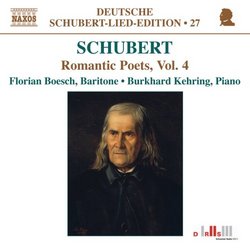| All Artists: Florian Boesch, Franz [Vienna] Schubert, Burkhard Kehring Title: Schubert: Romantic Poets, Vol. 4 Members Wishing: 0 Total Copies: 0 Label: Naxos Original Release Date: 1/1/2008 Re-Release Date: 7/29/2008 Genres: Pop, Classical Styles: Vocal Pop, Chamber Music, Historical Periods, Classical (c.1770-1830) Number of Discs: 1 SwapaCD Credits: 1 UPC: 747313006779 |
Search - Florian Boesch, Franz [Vienna] Schubert, Burkhard Kehring :: Schubert: Romantic Poets, Vol. 4
 | Florian Boesch, Franz [Vienna] Schubert, Burkhard Kehring Schubert: Romantic Poets, Vol. 4 Genres: Pop, Classical |
Larger Image |
CD Details |
CD ReviewsExploring the Schubert Songs -- Romantic Poets Robin Friedman | Washington, D.C. United States | 09/10/2008 (4 out of 5 stars) "During his short life, Franz Schubert (1797 -- 1828) composed over 700 lieder, virtually creating the genre of the art song. Whether classical or popular, songs tend to be short, ephemeral creations. They also tend to vary widely in quality. Of Schubert's large output, only a relatively small number of songs regularly appear on CD anthologies or in recitals. The opportunity for the nonspecialist to explore Schubert's songs in depth is rare indeed. I have been enjoying the ongoing complete Schubert song cycle on the budget-priced Naxos label. The series is organized by the pianist Ulrich Eisenlohr and, in addition to presenting Schubert's song output, offers the listener exposure to many young rising singers. A complete cycle of the Schubert songs featuring world-class singers is also available on Hyperion but at a price of at least twice that of each Naxos disk.
The Naxos series is arranged by the poets that Schubert set. This CD is the fourth of a group that Naxos describes as the "Romantic poets". It features baritone Florian Boesch, who has appeared in operas by Mozart and Haydn, among others. Boesch brings a deep, growling, but flexible voice to these Schubert songs. Burkhard Kehring, rather than Eisenlohr, accompanies Boesch on the piano. Kehring also performed on a recording of Schubert settings of poems by his friend Johann Mayrhoffer as part of the Naxos series. The fourteen songs on this CD are for the most part rarities. Lovers of Schubert will find joy in hearing these songs and in finding unfamiliar gems. The songs cover a variety of styles and stages in Schubert's short life. When the teenage Schubert started to compose songs, he began with the form of the ballad. This CD includes two ballads Schubert set in his late teens to texts by his near-contemporary Theodor Koerner (1791 -- 1813) The earlier of the two, "Amphiaros," D. 166 relates a Greek myth from the War against Thebes which Schubert sets to a driving piano accompaniment and to a vocal line of great force. The other early Koerner setting, "Father I cry to you", D. 171. is a more intimate work, setting out a soldier's fear in the face of battle. The CD juxtaposes two late Schubert songs which as Eisenlohr observes in his liner notes, show the two sides of the Romantic movement. The song, "Gravediggers Longing" D. 842, to a text by one Jakob Nikolaus Craiger (1797 --1855), is a somber, philosophical poem about the sadness and restlesness of life ending in the peace of death. But this lament is followed on the CD by Schubert's setting of "In the Forest" D. 708 to a text by Fredrich Schlegel (1772-1829) which in Schubert's setting moves powerfully and lyrically in a setting of pantheism and love of life and nature. Other songs on the CD explore these poles of the romantic temperament. The short song "The Pilgrimage" D. 778A, sets a text by Frederich Ruckert (1788 -1866) in a manner suggesting world-weariness and the need for spiritual redemption. The song "Her grave" D. 736, sets a text by Karl Englehardt that mourns the death of a beloved. One of the finest songs on this CD is "A mother's funeral song", D.616, poet unknown, which Schubert composed at the time his own mother died. The more ecstatic character of romanticism is suggested by Schubert's settings of "The Glow of Sunset", D. 627 by Aloys Schreiber and by "The Boatman" D. 694 by Friedrich von Schlegel in which the singer turns lusty eyes to a young maiden on shore. Schubert's setting of "Unbounded Love" D.854 is a longer romantic exploration of the joy of life and the unity of creation. Schubert's setting of a poem by Fredrich von Schlegel's brother, August, "Melodies of Life" D. 395 also sets a tone of affirmation. Two songs on the CD do not fit neatly into either model discussed above. Schubert's setting of "The Madonna" D. 623, with a text by Schreiber, is a lilting religious meditation inspired by a painting of the Virgin Mary. And Schubert's setting of a poem called "A Song of Old Age" by Ruckert has, alas, a personal meaning for me as the singer contrasts the frailty of his advancing years with the passion that still fires his heart. Ulrich Eisenlohr wrote the liner notes for this CD. The texts of the songs are not included, but both texts and translations are readily accessible on the Naxos website. Robin Friedman " |
